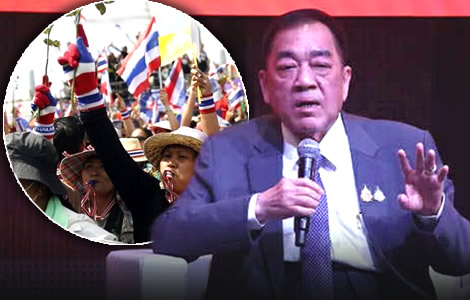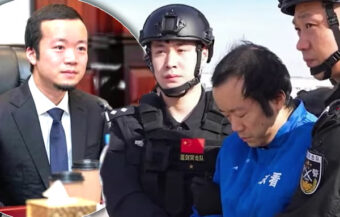Thailand’s business leaders are concerned over Anutin’s interim government, warning 25 years of political infighting and a collapsing economy risk spiralling into deeper crisis, with collapsing investor confidence, stalled reforms and widening public discontent.
Thailand’s economy is facing major headwinds and the looming threat of severe political instability following last week’s election of Anutin Charnvirakul as Prime Minister, with the new short-term interim government sparking deep concern among business leaders, as the previous Pheu Thai-led administration had finally mapped a coherent path forward, only for that momentum to risk collapse. On Monday, at an economic forum in Bangkok, Thai Chamber of Commerce Chairman Mr. Poj Aramwattananon warned that 24–25 years of relentless political infighting have crippled the nation’s growth and hurt its people, while the removal of the Pheu Thai government has already sent shockwaves and analysts fear the country’s political divisions will deepen, splintering power and dragging the already troubled economy further into uncertainty.

The election of Bhumjaithai Party leader Anutin Charnvirakul last Friday has not stabilised Thailand’s political landscape. Indeed, public opinion polls suggest that the newly formed government lacks broad support. Furthermore, analysts warn that instability could slow economic recovery and disrupt critical policy initiatives.
Mr. Anutin’s party won only 3% of the party-list national vote in the 2023 General Election. Since then, its support in opinion polls has grown modestly to around 6%. However, despite this increase, the party remains politically fragile and heavily dependent on alliances. Indeed, the party and its top leadership are under investigation.
Election Commission and DSI investigate widespread collusion and manipulation in 2024 Senate elections
A long-standing case has been advanced by the Election Commission into widespread collusion and manipulation of the 2024 Senate election. This is also being pursued by the Department of Special Investigation (DSI). It has opened a money laundering case and a secret society case. The elite police agency this week announced that it must still interview some 1,200 material witnesses.
Meanwhile, concern is rising over the People’s Party’s role in backing Mr. Anutin’s leadership. Pro-democracy insiders suggest the alliance reflects lingering resentment against the Pheu Thai Party.
Specifically, former Prime Minister Thaksin Shinawatra has previously criticised the People’s Party’s surprise choice as leader. This was this year on the hustings. Mr. Nattapong Ruangpanyawut, also known as ‘Teng,’ took up the role when the party was formed in August last year.
Notably, that came after the election-winning Move Forward Party was dissolved by the Constitutional Court. That was just weeks before the court also removed Prime Minister Srettha Thavisin of the Pheu Thai Party.
Certainly, public unease and criticism of the People’s Party and its leader among segments of the electorate rose sharply after Friday’s Prime Ministerial vote. Many pro-democracy voters feel alienated by the progressive party’s extraordinary political manoeuvre.
Thailand has now removed a government that had been in power for two years. That administration had attempted to implement a coherent economic plan, yet many initiatives remain incomplete. The kingdom’s economy grew 3% in the first half of 2025. However, forecasts indicate only 1% growth in the second half. Consequently, the outgoing government’s target of 2–2.3% annual growth is unlikely to be achieved.
Economic slowdown worsens as political instability and external factors continue to threaten growth prospects
Multiple structural and external factors underpin the slowdown. US tariffs have reduced export demand, while foreign tourist arrivals have dropped more than 7% through August.
Simultaneously, domestic banks are tightening credit, constraining private sector investment. Therefore, several agencies warn that growth could weaken further in 2026.
Political instability is at the heart of the problem. The Senate’s complaint against former Prime Minister Paetongtarn Shinawatra and her removal on August 29 triggered the latest uncertainty. Moreover, the upcoming Supreme Court hearing of Thaksin Shinawatra, where he could face imprisonment, adds further tension. Analysts warn that the latter case on Tuesday could send shockwaves throughout the political establishment.
Yet, the potential impact is complex. While some in Bangkok’s elite underestimate public reaction, it is likely to galvanise support for the Pheu Thai Party.
The party now faces the task of challenging the interim government led by Mr. Anutin. Additionally, it must appeal to pro-democracy voters, who represent roughly 65% of the electorate and opposed last Friday’s decision.
Observers note that Thailand is polarising politically into three distinct camps: blue, red, and orange. These represent the Bhumjaithai Party, Pheu Thai Party and People’s Party, respectively. Consequently, the political conflict is intensifying, and analysts warn that instability could escalate further.
Business leaders warn political volatility threatens Thailand’s economy and undermines investor confidence
Business leaders are increasingly vocal. They argue that this political volatility is the last thing the economy needs. In fact, some describe it as national economic suicide, given the risks to investment, fiscal planning and public confidence.
The People’s Party had previously promised to act above partisan resentments and junta-style politics. Yet last week’s events severely tarnished that image.
Despite these challenges, international observers continue to recognise Thaksin Shinawatra’s economic legacy. Under his leadership, Thailand achieved unprecedented growth and development. Even if he is imprisoned, analysts argue that his record will remain influential in shaping public perception.
The Thai Chamber of Commerce has repeatedly emphasised that political instability is Thailand’s largest economic obstacle. On September 8, at the seminar “Transforming Thailand for the Future and Sustainability,” Mr. Poj Aramwattananon, Chairman of the Chamber, highlighted these issues. He explained that governance conflicts over the past 24–25 years have slowed the country’s growth.
Thai Chamber of Commerce highlights lack of consistent national policy as key factor limiting economic growth
Mr. Poj stressed that Thailand suffers from a lack of a consistent national agenda. Key projects, such as large-scale irrigation, data centres, and education reforms, frequently face delays. Furthermore, each change of government often cancels or restarts prior initiatives. As a result, infrastructure projects like the high-speed rail remain incomplete. Despite private sector readiness, legal and policy uncertainty prevent decisive action.
He further emphasised that the private sector is a powerful engine of national income. However, policy uncertainty constrains its speed and scope. Young entrepreneurs, in particular, face significant barriers that established companies can avoid. Consequently, innovation and economic diversification remain limited.
To address these challenges, the Chamber has expanded engagement across major sectors. Agriculture, tourism, international trade, digital technology, AI, innovation, and clean energy are now focal areas.
Additionally, the Chamber is working to connect local chambers nationwide to propose actionable policy solutions. These measures aim to strengthen Thailand’s competitiveness and ensure long-term economic resilience.
Workforce development and international trade cooperation critical for sustaining economic recovery
Education and workforce development remain central to Mr. Poj’s strategy. He argues that high-quality workforce training is essential for supporting new technologies and attracting investment.
Similarly, bilateral economic cooperation with major trading partners, including China, the United States, Japan, India and Europe, is critical. Successful Free Trade Agreement negotiations with the EU could boost exports and accelerate recovery.
Economic analysts highlight the urgency of strong leadership. Nonarit Bisonyabut, research fellow at the Thailand Development Research Institute, asserts that political conflicts prevent long-term policies from bearing fruit.
He emphasised that leaders must inspire confidence, both domestically and internationally. Only decisive leadership can guide Thailand through short-term crises and build sustainable growth.
Mr. Nonarit also stresses the importance of policy consistency. He argues that Thailand should focus on sectors where it has competitive advantages, such as electric vehicles or semiconductors. Clear, decisive implementation could position the country as a global supply hub. Conversely, inconsistent leadership will continue to erode investor confidence.
Political instability drives populist policies and limits growth in tourism and high-value industrial sectors
Political instability accelerates populist policies, Mr. Nonarit adds. Short-lived governments focus on cash handouts rather than long-term growth. Meanwhile, rising public debt limits fiscal space for infrastructure and industrial initiatives. Analysts warn that the country risks stagnation unless strategic interventions occur promptly.
Industrial policy is another area requiring urgent attention. Analysts emphasise preserving export markets and focusing on high-value sectors. Opportunities exist in supply chains connected globally, yet these require stable governance and long-term planning. Tourism is similarly critical, as arrivals have yet to recover to pre-pandemic levels of nearly 40 million visitors.
Thailand also faces demographic challenges. An ageing population requires policy adaptation to generate new revenue sources. Analysts recommend positioning Thailand as a regional medical and healthcare hub. This approach could diversify income streams and create high-value opportunities.
Economic forecasts remain weak without stable leadership and clear national development strategies
Economic forecasts for 2025 are cautious. GDP growth is expected at 1.5–2%, likely settling around 1.7–1.8%. Next year may see similar or lower growth unless policy continuity and leadership improve. Analysts warn that stagnation will persist without new engines of growth or confidence-building measures.
Despite these hurdles, opportunities remain. Targeted investments in technology, supply chains, tourism, and education could yield sustainable growth. However, successful implementation hinges on political stability. Without it, both domestic and international investors may hesitate to commit resources.
Thailand’s political landscape remains volatile, and recent events highlight the urgency of reform. Court proceedings involving prominent figures, party realignments and leadership shifts continue to generate uncertainty. Analysts argue that the country must stabilise governance to unlock long-term economic potential.
Strong leadership and consistent policies are essential to secure investor confidence and long-term prosperity
Strong leadership, consistent policies and investor confidence are essential to reversing stagnation. The private sector is capable but presently constrained. Political conflicts threaten economic performance and Thailand’s global competitiveness. National action, which requires political unity, is required to protect growth prospects and public trust.
Certainly, Thailand’s political instability is its most pressing economic challenge. Observers stress that only stable governance, a clear national agenda and decisive leadership can secure long-term prosperity. Without this, both public and international confidence risk erosion. Economic growth will undoubtedly remain constrained.
Thaksin stuns Bangkok’s political establishment by returning from Dubai ahead of his Tuesday hearing
Bizarre court challenge launched by Pheu Thai against interim government deal that elected Anutin as PM
The coming weeks will be critical. Policymakers, businesses and civil society must navigate an unfolding drama of political uncertainty amid economic pressures. Only through strategic coordination and sustained action can any Thai government realise the kingdom’s economic potential and restore confidence. We are very far from that now.
Join the Thai News forum, follow Thai Examiner on Facebook here
Receive all our stories as they come out on Telegram here
Follow Thai Examiner here
Further reading:
Thaksin stuns Bangkok’s political establishment by returning from Dubai ahead of his Tuesday hearing
Thaksin tells Pheu Thai leaders he will return on Monday to face Tuesday’s Supreme Court hearing
People’s Party meeting on Monday ended in chaos as it failed to decide on who it will support for PM
Strong case for Chaikasem Nitisiri to lead an interim government tasked with Constitutional change


















